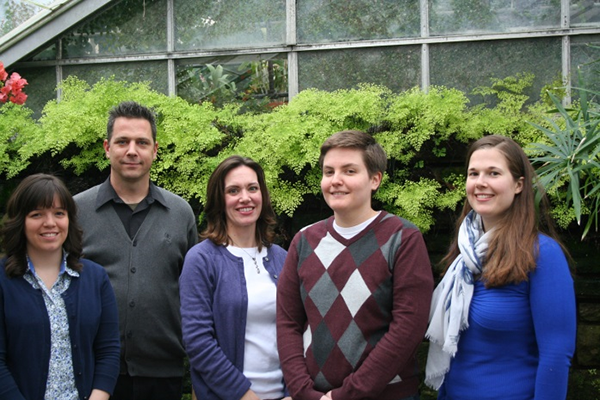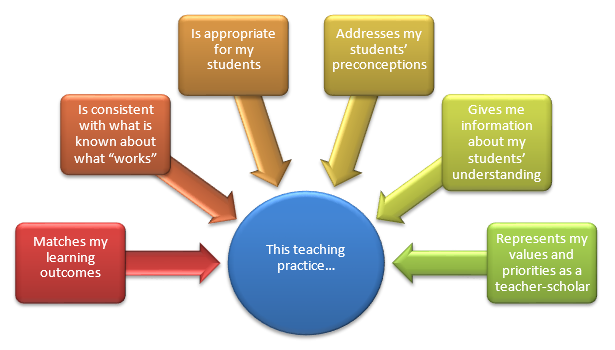Preparation of graduate students for teaching has historically emphasized two types of experiences: teaching assistant (TA) orientations and preparing future faculty (PFF) programs (Fig. 1). TA orientations provide new associate instructors (also called teaching assistants or graduate student instructors) with basic knowledge of institutional policies and “survival” skills in lesson planning, classroom management, and grading. As these students near the end of their graduate education, their participation in PFF programs prepares them for the teaching and research expectations of faculty members at different educational institutions.

Figure 1. Instructor preparation activities aligned with critical transitions in graduate student life.
Some graduate students experience a critical gap in teaching support between TA orientations and PFF programs. Through experiences such as advanced pedagogy courses and learning communities, mid-career graduate student instructors productively reflect on their current teaching experiences and put those reflections into practice. These programs promote evidence-based instruction to facilitate mid-career graduate students’ development as teacher-scholars whose practice is both grounded in the literature and contextualized by evidence of their students’ learning.
At IUB, graduate students with some teaching experience and pedagogical training can hone their skills in evidence-based teaching through advanced pedagogy courses in the disciplines, department-based certificate programs, and learning communities. These programs share some common features in that graduate student participants:
- Identify a disciplinary concept or skill that is perennially difficult for students;
- Implement a teaching innovation to foster their undergraduates’ disciplinary knowledge and skills;
- Document, assess, and reflect on their students’ learning through a course or teaching portfolio;
- Immerse their practice in a shared bibliography of teaching and learning literature;
- Work with faculty and staff from the CITL who are active participants in the scholarship of teaching and learning both locally and nationally; and
- Collaborate with other graduate students on teaching and learning challenges.
These advanced pedagogy programs intentionally promote collaboration and dialogue at a time when mid-career graduate students might otherwise feel isolated in their research and teaching lives. Multi-disciplinary programs, such as the Teagle Foundation-funded Collegium on Inquiry in Action and the subsequent Paths to the Professoriate Graduate Student Learning Community, promote cross-disciplinary feedback on and appropriation of teaching strategies and learning assessments. In contrast, graduate students in the intra-disciplinary Science Education Assessment Scholars (see photo; funded by a grant from the Council of Graduate Schools) collaboratively address a discipline-specific curricular concern while advancing their pedagogical foundations and evidence-based practices.

Science Education Assessment (SEA) Scholars (l-r: Lisa Wiltbank, Brian Winterman, Katie Kearns, Jakki Petzold, and Sarah Keesom).
These programs help graduate students make informed, purposeful, and flexible instructional choices (Fig. 2). In addition, these programs help graduate students articulate their approaches to their students, colleagues, and future academic employers through a syllabus, a statement of teaching philosophy, and a teaching portfolio. Program participants have shared their evidence-based course innovations with the larger scholarly community through course portfolios, conference presentations, and peer-reviewed publications (Hobbs et al., 2013; Robinson et al., 2013; Robinson et al., in press; Shannon and Winterman, 2012). These outcomes provide evidence of the graduate students’ capacity to address conceptual roadblocks to understanding as disciplinary content knowledge becomes more complex, as teaching strategies incorporate more technology, and as undergraduate populations become more diverse.

Figure 2. Graduate students who engage in evidence-based teaching practice make intentional, purposeful instructional choices.
Contact the CITL if you would like to design a program for mid-career associate instructors or want to become involved in an advanced pedagogy experience.
References
Hobbs, F.C., Johnson, D.J., & Kearns, K.D. (2013). A deliberate practice approach to teaching phylogenetic analysis. CBE – Life Sciences Education 12, 676-686.
Robinson, J. M., Gresalfi, M., Sievert, A. K., Christensen, T.B., Kearns, K.D., & Zolan, M.E. (2013). Talking across the disciplines: Building communicative competence in a multidisciplinary graduate-student seminar on inquiry in teaching and learning. In K. McKinney (Ed.), The scholarship of teaching and learning in and across the disciplines (pp. 186-199). Bloomington, IN: Indiana University Press.
Robinson, J.M., Kearns, K., Gresalfi, M., Sievert, A., & Christensen, T. (In press.) Teaching on Purpose: A Collegium community model for supporting intentional teaching. Journal on Excellence in College Teaching.
Shannon, S., & Winterman, B. (2012). Student comprehension of primary literature is aided by companion assignments emphasizing pattern recognition and information literacy. Issues in Science and Technology Librarianship, 68.

